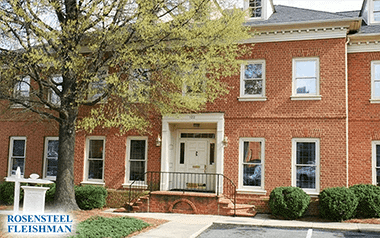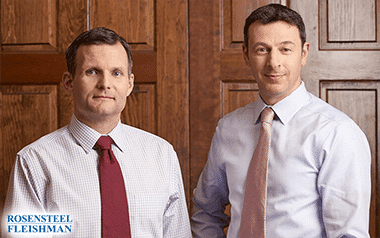Injured in a Charlotte, NC Car Accident and Need an Attorney?
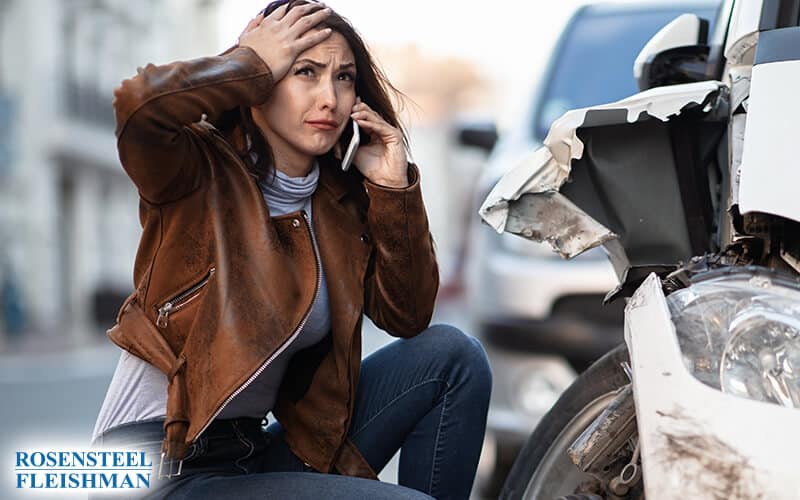
When you’re dealing with the aftermath of a car accident, there’s a lot to think about. Who is going to pay for your medical bills? How is your car going to get fixed?
In catastrophic car injury cases, people question how they will take care of their families if they or a loved one is unable to work again. We know it can be difficult to know where to begin. The last thing you want to question is whether you have the right lawyer for your car accident.
If you have been injured in a car accident, it's likely that you're wondering whether there is any legal recourse to help alleviate your suffering. Even if the other driver did not have insurance at the time of the accident you may still be entitled to compensation.
After you've received proper medical attention for your injuries, the lawyers who represent the Charlotte based law firm Rosensteel Fleishman would like to speak with you regarding your auto accident. Our attorneys have close to 40 years of combined legal experience handling a variety of legal cases for North Carolina residents.
Call to Schedule a Free Consultation
Why Do I Need a Lawyer in North Carolina?
By hiring a qualified NC lawyer, you will know what the legal process involves and how to proceed forward with your case. An attorney will have extensive knowledge in this kind of situation, with experience helping you collect your compensation for the injuries and losses suffered during the accident.
As a result of the accident, you may have suffered head injuries and missed work. Transporting yourself to therapy sessions or other medical appointments could also cost you money.
In addition to the physical pain and suffering you endured, you may have been affected emotionally by the car accident. Many people experience significant anxiety when they are uncertain how they will pay their bills. If you have an accident that prevents you from working, you may be eligible for financial assistance.
To be safe, it is crucial to speak with a North Carolina lawyer who focuses on car accident cases. The legal professional will review the details of your case and help you decide if you should proceed forward with a claim.
What Does A Car Accident Lawyer Do?
It can be difficult to understand the implications of an automobile accident or what your legal options are after a car accident. If you have been injured in such an incident, it is important to talk with a Charlotte attorney about your rights and how best to proceed with building your case for monetary compensation for medical bills, lost income, pain and suffering.
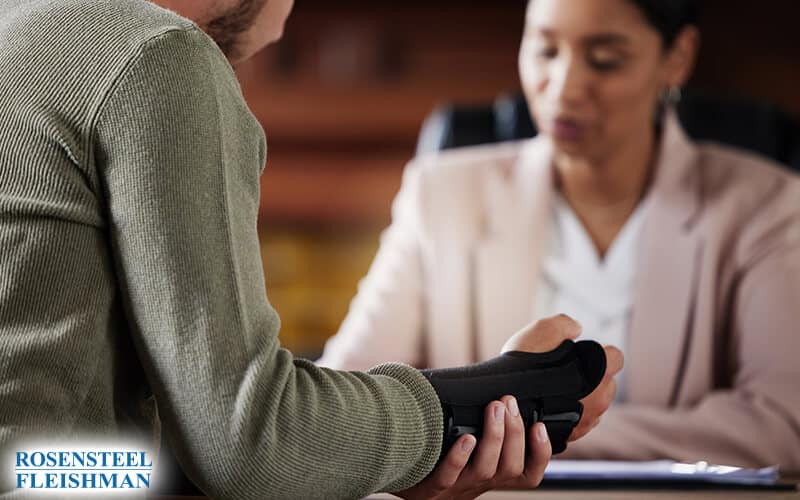
It is important that you do not try to handle your case alone, especially if your injuries are severe. An attorney can help you understand your rights and what compensation you may be entitled to after an accident.
Hiring a lawyer is one of the best ways to ensure that you have adequate representation during this difficult process. An attorney will be able to help you build an aggressive case while answering all your questions and providing legal options available to you. There's no need to go through this process alone when you can have an experienced lawyer by your side.
Recent Examples of Car Accident Settlement Amounts and Payouts in North Carolina
$2,200,000 Car Accident
Facts: A drunk driver struck a car with four members of the same family. One family member was killed (and represented separately). The other family members suffered injuries (our clients). The defendant driver carried minimum limits coverage. After extensive investigation, we were able to identify the bar where the drunk driver had been drinking. The insurance carrier for the bar denied liability. We filed suit in State Superior Court. After substantial discovery, the bar tendered the policy limits of two million dollars rather than go in front of a jury.
$450,000 Car Accident
Facts: Our client was killed in a car accident on US-74 in Indian Trail, Union County. The claim was denied by the insurance company claiming the client was stopped in the road. The investigative report by the Union County Police and NC Highway Patrol found our client responsible for causing the accident. Our client’s car insurance company also found our client responsible and paid for the damage and injury to the other driver. We disagreed. A lawsuit was filed on behalf of the Estate and his wife in Union County against the other driver.
$360,000 Car Accident
Facts: Our client, a driver, was hit when entering an intersection. Our client fractured her femur. Liability was contested by the defense insurance carrier and defense counsel was hired. Defense counsel argued our client entered the intersection on a green light. We disagreed with the defense counsel and moved forward with the case.
When Should I Get a Lawyer for My Auto Accident?
If you've been in an accident, the first thing to do is go to a hospital for professional medical attention. A medical professional will be able to help assess the extent of your injuries and provide necessary medical treatment. Taking pictures of your injuries and of the crash scene with your phone can be useful to your case. If possible, try to gather contact information of any witnesses to your accident.
What Rights Does a Car Accident Victim Have?
It is important to hire a qualified auto injury attorney as soon as possible to preserve your legal rights if you have been injured in an auto accident and need help. A lawyer can help you understand what compensation options are available to you and how best to move forward with your claim. If you wait too long, it may become more difficult to get the compensation you deserve.
Another advantage of hiring a Charlotte car accident lawyer is the opportunity to pursue car injury claims. This means that you could receive compensation for your injuries, not just medical bills and wages lost from time off, but also pain and suffering!
As a victim of an accident, you may be entitled to recover financial compensation for your injuries and other damages. Compensation includes medical bills, lost wages, pain and suffering (including emotional distress), and property damage in some circumstances.
Collision insurance does not cover all types of claims. If you're involved in a car accident a lawyer can help you pursue further claims against the other party or their insurance company.
What to Look for in an Auto Accident Attorney?
In the aftermath of a car accident, it can be difficult to know where to start. Whether you are dealing with liability issues or insurance-related matters, having an attorney on your side who is familiar litigating these types of cases is vital to your success.
A good lawyer can help document your injuries and pursue compensation for your expenses. A lawyer also will be able to determine the cause of the accident, as well as build a strong case against the other driver.
You'll want to make sure your attorney has experience handling car accident cases. The more experience they have, the better equipped they will be to handle your case. Remember, you have the right to ask questions and make sure you feel comfortable with your attorney.
Why the Insurance Company Won’t Pay Your Bills
North Carolina is a liability state. This means that insurance companies are not required to pay anything until the case has settled. Further, insurance companies do not pay the medical bills until they have reviewed the records and have satisfied themselves that the treatment was causally related to the car accident. This is when the advice and counsel of an experienced attorney becomes invaluable. When a client initially meets with our lawyers, we explain how insurance companies attempt to avoid paying on their claim and how our clients can protect themselves. Some of the most common mistakes made are the easiest to prevent with the advice and council of a qualified legal team.
People often assume that if the other driver was clearly at fault, then they won’t need a lawyer since the insurance company will pay for all their medical bills, lost wages and pain and suffering. Unfortunately, this is not true.
How to Choose the Right Charlotte Car Accident Lawyer?
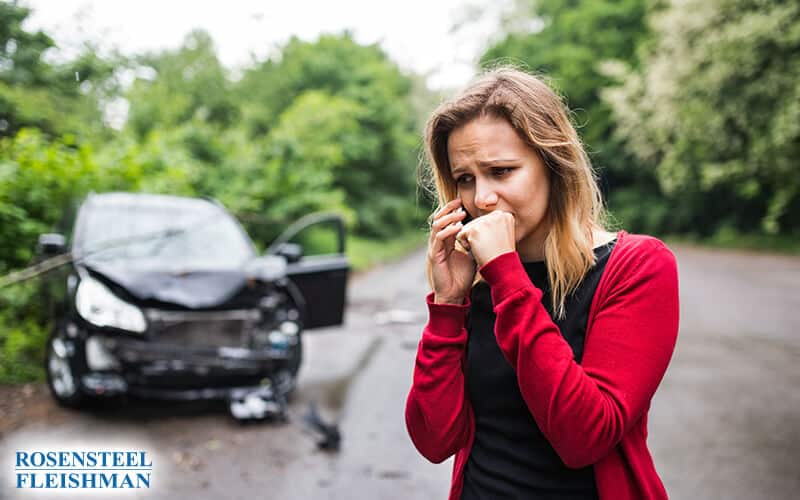
Finding a lawyer with experience handling car accident cases like yours can make all the difference in determining how smoothly things go for you. It is important to find someone who has a solid track record of winning settlements for his or her clients and is also experienced at representing their clients. Your lawyer should be able to advise you of the available options for seeking compensation for your losses. Also, a good attorney will be familiar with the laws and regulations that govern car accident cases as well as how to work with insurance companies.
The following are some questions to ask when interviewing potential attorneys:
- What percentage of your practice is devoted to car accident cases? (Ideally, an attorney should have at least 50% of his/her practice devoted to these cases.)
- How long have you handled car accident cases? (An attorney with less than three years' experience probably isn't going to know as much as one with more experience.)
- What is your win rate? (Look for an attorney who wins at least 75% of his cases.)
- What are your fees? (Make sure the attorney is affordable.)
- Will I have to pay any fees up front? (If so, they should be refundable if you don't win your case.)
- What is your availability? (Make sure the attorney will be available when you need him or her.)
- How do you prepare for a case? (Look for an attorney who thoroughly investigates your accident and knows what to do next.)
- How will you keep me informed about my case? (Look for an attorney who keeps you updated on what is happening with your case.)
Why Hire Rosensteel Fleishman as Your Car Accident Lawyer in Charlotte, NC?
Our legal team understands the complex nature of car accidents and has experienced attorneys who can help you pursue your fair compensation. Our attorneys know how to navigate the legal system so that you get what is owed - just like they have been doing for North Carolina clients for over 15 years.
Rosensteel Fleishman, a law firm with decades of combined experience, has the knowledge and experience to help you navigate the legal system. Our lawyers have an impressive track record of success and have handled complex injury cases like yours for many years. We are here for you during this difficult time and will work to get the compensation you deserve.
We know that every case is unique, and we approach each one with care and diligence. We will protect your rights, your interests, and your future. Our auto injury attorneys are available 24/7 to help you with any questions you have about your case or the legal system in general. Need a Charlotte car accident lawyer? Contact Rosensteel Fleishman today!
How Our Car Accident Attorneys Can Help You
Our NC car accident lawyers help people recover compensation for the injuries and damages they suffered in a motor vehicle incident. If you were injured in an automobile accident, the Rosensteel Fleishman team can provide professional legal counsel to navigate through the stressful process of recovering compensation.
When you know you are dealing with a serious injury or accident, it is important to speak with your injury attorney as soon as possible. By working closely together during the initial stages of the case, a lawyer can help develop a plan for how best to proceed forward. They can also help you obtain any necessary paperwork, including your Charlotte police accident report.
Last, but certainly not least, it’s important to follow your lawyer’s guidance. Your attorney will be able to give you specific advice on how to handle your case, and you want to avoid making any unnecessary mistakes.
We are committed to providing our clients with the highest quality legal services. Our Charlotte, NC based law firm has been in business for over 15 years, and we have the experience and resources necessary to help you receive the compensation you deserve. Call us today at 704-714-1450 or contact us online to schedule your free consultation.
How Much Does a Car Accident Lawyer Cost?
If you've been in an accident and need legal representation, our law firm provides free consultations to determine if we feel our lawyers would be a good fit for your auto accident case. Once your matter has been reviewed and approved by our legal team, we will discuss the fee structure with you. Since every case is unique and individualized, we prefer to talk with potential clients about their needs before any fees are discussed.
What Will be Discussed at Our Initial Meeting?
The initial meeting will be focused on your medical care. We'll make sure that all your medical issues are being addressed and that you're getting the best possible treatment. If a client doesn't have insurance to cover their health care costs, we can refer them to the doctors we work with throughout North Carolina who provide excellent quality treatment without requiring health insurance.
One of the first things our lawyers will explain to you is that after being injured in a car accident you can bring a claim against the at-fault party’s insurance carrier. From the point of view of the insurance carrier the value of the claim is dependent on how clear the liability is and the extent of the injury.
In many situations the insurance carrier will attempt to reduce its exposure by arguing that its insured was not at fault, was partially at fault, or that the car accident did not cause the injury claimed by the plaintiff/claimant. Our lawyers will explain what each defense means as well as the counterargument.
Types Of Automobile Accidents We Handle
The car accident lawyers in Charlotte, NC at Rosensteel Fleishman handle all types of car accident cases and understand the complex legal issues that surround them. Our attorneys are committed to defending your rights in court following an auto accident so you can focus on your recovery. If you or someone you love has been injured or killed in a car accident, Rosensteel Fleishman law firm is here to help. If you find yourself involved in a trucking accident in Charlotte, contact one of our Charlotte truck accident lawyers to ensure your rights are protected.
- Head-On Accidents
- Rideshare Accidents
- Rear-End Accidents
- Drunk Driving Accidents
- Rollover Accidents
- Truck Accidents
- Motorcycle Accidents
- Distracted Driving Accidents
- Pedestrian Accidents
- Hit-and-Run Accidents
"I am very happy to post this review about Matt Fleishman and his team! After my accident it was a very stressful time for me physically and and emotionally. From the first meeting with Matt i knew that i was in good hands. I am very pleased with the outcome of my case and the settlement received. Leaving no stone unturned and excellent service, hands down Matt Fleishman and his team at Rosensteel Fleishman come highly recommended from me. To those dropping by and reading this i will say “You have come to the right place.” So…Thanks to you Matt and your team at Rosensteel Fleishman….."
Neil Simcox - Google Review
What Causes a Car Accident?
Car accidents can be caused by several things, including:
Distracted Driving: Distractions are one of the most common causes of car accidents. Talking on your phone, texting, or eating while driving are activities that can easily be avoided.
Driving Under the Influence (DUI): Alcohol and drugs impair drivers' judgment and reflexes, which makes them more likely to cause a car accident.
Speeding: Drivers should always obey the speed limit and be cautious of icy roads, potholes and other road hazards that can cause an accident.
Driving Too Slow: Many drivers ignore the speed limit by driving too slowly, which can cause accidents.
Mechanical Problems: This can include issues with the brake, steering or suspension system.
Other Drivers: The person driving another vehicle may be at fault for causing a crash.
Poor Weather Conditions: Driving recklessly in snowy or rainy conditions can be very dangerous and will likely result in a crash.
Tailgating: Tailgating happens when a driver follows too closely behind another vehicle. An accident will occur if the first car stops before the other car can react.
How to Prevent Car Accident Injuries
Preventing car accidents is an important goal for individuals, communities, and governments around the world. While it is not always easy to prevent car accidents, there are several steps that can be taken to reduce the risk of them occurring. Some of these steps include:
Wear a Seatbelt:
Wearing your seatbelt can increase the chance of surviving a car accident and decrease the chance of injury. Furthermore, it is one of the simplest things you can do to protect yourself from injury in an accident.
Drive Sober:
Never drive a car or other vehicle if you are under the influence of drugs or alcohol.
Stay Alert:
Always keep your eyes on the road ahead and don't let yourself become distracted by your phone, the radio, or your passengers.
Drive Safe:
Obey the speed limit, stay in your lane of traffic, don’t tailgate, and use your turn signals.
Car Accident Injuries
Victims who are hurt in a car accident may experience physical pain, such as soreness or stiffness, as well as mental discomfort, such as stress or depression. Many victims of car accidents also experience other physical symptoms, such as headaches or neck tension.
Car accident victims may develop a wide range of mental health conditions, including anxiety and depression, panic attacks and trouble sleeping, as well as a variety of emotions like anger or guilt towards the person who caused the accident. They also are at risk for post-traumatic stress disorder (PTSD) after the traumatic event.
If you were injured in an accident due to the negligence of another driver, our attorneys can help pursue compensation for your losses. We have the experience to help you recover the financial compensation you deserve. Learn more about back injury settlements.
What Should I Do After a Car Accident?
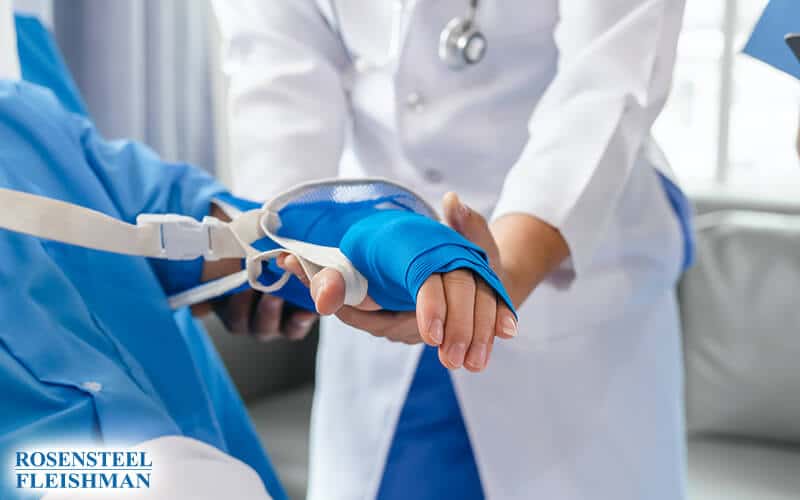
If you are involved in a car accident, it can be an understandably scary experience. Regardless of who is at fault for the crash, taking your time to think about your next step carefully will help ensure that you stay calm and safe.
Call Police or Emergency Services
First, call the police and report the accident. The police will ask you to provide details about the accident, including where it happened, what happened and how badly you were injured. They will be able to direct EMS to your location so you can be examined for injuries.
Check On the Other Involved Parties
In the event of an accident, it is important to assess your own injuries before anyone else's. Then if possible and safe, check on other victims to see if they have broken bones or serious injuries that could be life-threatening if not treated properly.
Exchange Contact Information
Make sure to get the driver's license and other personal information of everyone involved in the accident. If there are any witnesses, request their contact information as well.
Document The Accident Area
If you're in an accident, it's also a good idea to take pictures of the scene with your phone. If there are any injuries involved with the crash, taking pictures may be beneficial.
Seek Prompt Medical Attention
If you were injured in a car accident, call 911 immediately and let the ambulance know that you need medical help. Depending on your injuries, it may be necessary to see a doctor or go to the hospital for treatment. Do not delay getting treatment for your injuries.
Call a Charlotte Car Accident Lawyer
If you are involved in an accident regardless of whether you have been injured, it is best to call a lawyer immediately. An attorney can advise you on how best to proceed to ensure that your rights are protected.
Common Questions for Car Accident Cases
Below are some questions that we regularly hear from our clients regarding their auto accident cases.
How Do I Find a Good Charlotte Car Accident Lawyer?
The best way to find a great Charlotte car accident lawyer is by asking other people who have used them. You can also ask your friends, family, and co-workers. Another great way to find a good Charlotte car accident lawyer is by doing a Google search and comparing the reviews. Rosensteel Fleishman has been in business for over 15 years serving the Charlotte, NC area.
Why Should I Hire a Charlotte Car Accident Lawyer if I Can Handle My Case Myself?
Most individuals don't understand the law, can't navigate the court system, and therefore have a huge disadvantage in trying a case against an insurance company. Therefore, it makes sense to hire a Charlotte car accident lawyer. An attorney can handle your case at a level that you simply cannot do yourself.
What Is a Charlotte Car Accident Lawyer?
Car accident attorneys help people who were involved in a car accident, whether they are the victim or driver of an accident. They can also help individuals who were injured in a car crash and are seeking financial compensation for injuries sustained.
How Much Does it Cost to Hire a Charlotte Car Accident Lawyer?
At Rosensteel Fleishman we feel it's in your best interest if we offer a free consultation to learn about your case and individual circumstances before we begin to draft a retainer agreement. We want you to feel confident that our service is right for you and your situation.
Is There Any Other Way to Handle my Case Without Hiring a Charlotte Car Accident Lawyer?
There might be situations where you can handle your case on your own. However, it is always wise to consult an attorney before making any decisions. An attorney can help you navigate through the legal system and provide guidance that is informed and tailored to your situation.
Who Pays for My Medical Treatment After an Accident That Wasn’t My Fault?
If you were injured in an accident because someone else was at fault, it is possible that your healthcare expenses will be covered. Insurance companies will fight to pay as little as they can get away with.
What is the Average Settlement for a Car Accident?
The average settlement varies greatly for car accident cases. It depends on the circumstances of the crash, such as who was at fault and how serious the injuries were. A minor fender bender might result in a low settlement, but a serious crash with severe injuries could result in much more money. Every case is different and numerous factors go into determining the value. Further past success does not guarantee the same outcome.
What if the Other Driver Doesn’t Have Insurance?
If you’re involved in a car accident with someone who does not have insurance, it’s in your best interest to contact an experienced injury attorney as soon as possible. These professionals are trained to evaluate the situation and help you pursue the best possible outcome through the court system. There are multiple possibilities available to get compensation when involved in a wreck with someone without insurance.
What Happens If the Accident Was Caused by a Driver With No License?
If you are involved in a car accident with someone who does not have a license, you may be able to sue them and collect damages. However, you should consult a legal professional before doing so.
What Can I Do if Insurance Denied My Claim?
You should keep a detailed record of your communication regarding your claim with an insurance company. If they deny it, make sure to get their reason and what you said about it. Keep copies of all medical records and doctor's notes that might come in handy. Last, if you haven't already done so, hire an attorney who is experienced in car accident cases.
How Can a Lawyer Help Me File My Insurance Claim?
If you're not satisfied with the response from an insurance company or medical provider, a lawyer can help. An attorney can offer advice about how to structure your claim and gather documents to support it, as well as examine the validity of your medical claims.
How Long Do I Have to File a Claim?
North Carolina has different statutes of limitations (the law) which govern how long you have to file a lawsuit. Failure to fail a lawsuit within that time period will result in the complete waiver of your claim. In a typical car accident, which did not result in the death of the client, the time to file is 3 years. You lose the right to sue if you do not file within the legal time allowed.
How Do You Prove Who Was at Fault?
The best way to get a good result in court for your car accident case is by having evidence of the incident. For example, you can have photographs or even an official police report. The more solid proof you have, the stronger your case will be, resulting in a better outcome.
Do I Need to Wait to Hear From the Insurance Company Before I See a Doctor?
Your health is more important than anything else. As such, you do not need anyone’s permission before receiving treatment for your injuries. Many people make the mistake of failing to tell their doctor all their symptoms or waiting too long to go to the doctor after the accident. Gaps in treatment can result in irreparable damage to your claim. We tell our clients to always make their health the number one priority and get the care they need.
What Is Contributory Negligence?
Contributory negligence deals with the negligence of the plaintiff. Insurance companies will look to deny your case if they can show contributory negligence. If the insurance company can show that you contributed in any way to causing the accident, it will attempt to avoid making any payments whatsoever, including payments for medical bills, pain and suffering and damage to your vehicle. Therefore, we do not let our clients speak with the insurance company.
What If My Vehicle Was Defective?
If you believe that your vehicle was defective and contributed to your accident or injuries, you should speak to a lawyer to learn about your legal options. In addition to pursuing a claim against the manufacturer or seller of your vehicle, you may also be able to pursue a claim against the third party who was responsible for your accident, such as a driver who was speeding or driving recklessly.
Should I Speak With the Insurance Company Before Speaking With a Lawyer?
No, it is best to speak with a lawyer prior to discussing your accident with your insurance company. By speaking with an attorney first, you can receive legal advice about your case, which will help you avoid making a costly mistake. At Rosensteel Fleishman, our lawyers do not let our clients speak with the insurance carrier directly.
Will I Get Compensated for What I Am Going Through?
While we cannot make a guarantee that you will receive a settlement, our lawyers work to find every possible source of money to compensate you for your car accident injury. Our North Carolina legal team makes sure our injury clients are fully informed about the financial and legal aspects of their case every step of the way. All the Rosensteel Fleishman car injury attorneys routinely field questions regarding auto accidents in Charlotte and throughout North Carolina.
Contact a Car Accident Lawyer in Charlotte Near You
If you've been in a car accident, contact one of our local injury attorneys near you as soon as possible. Not only will our attorneys discuss your case with you personally, we also will be able to provide you with professional legal counsel throughout the process.
Our lawyers have handled auto accident cases all over North Carolina and are regularly brought in to assist other lawyers with their clients’ cases. Many clients who have experience with other law firms are surprised by the level of communication and transparency they receive from our office. You will have complete access to your attorney, and you will have the ability to speak with them about your case at any time.
There is no fee to speak with one of our Charlotte lawyers. We handle car accidents in Charlotte, Gastonia, Concord, and across North Carolina. We are confident that we can help you with your car accident case, and we are ready to represent you. We look forward to working with you to recover the compensation you're owed for your losses and injuries.
Call (704) 714-1450 to make an appointment to speak with a Charlotte Car Accident attorney.
See What Our Clients Are Saying
"Really great to work with. Very trustworthy and hard working for you. I would never use anyone else for an accident claim."
John C.
Rating 5/5 ⭐⭐⭐⭐⭐
See our 5.0 rating and read more of our 740+ reviews on Google
